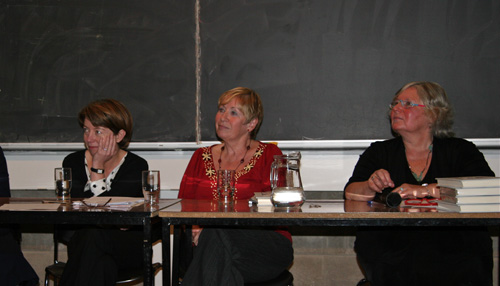New Book Presents Social, Religious and Gender-Role Attitudes of Irish Catholic and Protestant Women
Posted on: 01 November 2010
A recently published book entitled A Comparison of the Social, Religious and Gender-Role Attitudes of Catholic and Protestant Women in Ireland by Dr Florence Craven of the Social Attitude and Policy Research Group at Trinity College was recently launched in TCD. The book presents the results of a comparative study of the social, religious and gender-role attitudes of Catholic and Protestant women in Ireland carried out on more than 500 women during 2002 – 2006 in 12 counties throughout the Republic of Ireland.
The study included in-depth personal interviews with 48 women, followed by the main quantitative phase with 467 women, half Protestant and half Catholic. The sample was stratified by age (21 – 45 and 46-70) and by rural/urban location.
Welcoming the study, Dr Margret Fine-Davis, Director of the Social Attitude and Policy Research Group, School of Social Sciences and Philosophy, who chaired the lecture and book launch, said that the study was ground breaking as it was the first time that Protestant women’s social, religious and gender role attitudes had been compared to those of Catholic women. In particular, the comparison of women’s attitudes to their respective churches and perceptions of their church’s treatment of women was a unique contribution to social research in this country, which would provide valuable baseline data for future studies.

Professor Linda Hogan, Dr Myrtle Hill and Dr Margret Fine-Davis.
Dr Craven said that despite the secular nature of Irish society, religious practice and belief are still of great importance to both Catholic and Protestant women. While women did not need the security of church control in society, they did, however, want religious belief to prevail on the basis of private, individual belief. Although Catholic women were slightly more religious than Protestants, they were, however, more likely than Protestants to believe that when acting in its social role, their church inflicted guilt and oppression on them.
Protestant women generally held more positive attitudes towards their churches and their church’s treatment of women. Catholic women, on the other hand tended to be critical of their church and to see their church as having a negative effect on their lives.
Most of the Protestant women in the sample (94%) agreed with the statement: “It would be true to say that my church regards women with a lot of respect.” This contrasted with the views of Catholic women, of whom only 26% felt that this was true of their church. Catholic women, on the other hand, were more likely than Protestants to feel that their church “has tried to control the position of women in society”: 72% of Catholic women agreed with this, as compared with 20% of Protestant women in relation to their own church.
Over half of the Catholic women (60%) expressed the view that “my church appears to put men first, so society inevitably reflects this.” In contrast the majority of Protestant women (68%) disagreed with this in relation to their own church and just one third agreed.
There was strong support on the part of both groups for female clergy. The vast majority of Protestant women (95%) favoured having women clergy. A large majority of Catholic women also felt this way, with 84% agreeing that “it would only be fair to let women become priests/ministers on an equal footing with men.”
“It is very possible that the Catholic Church will not change its attitude towards women while it sees that women continue to support it, despite the absence of women priests.” Dr. Craven said
Catholic women were more likely to have positive attitudes towards their majority status than Protestant women had towards their minority status. However, the majority of Protestants (60.5%) disagreed that “speaking out” would not be in their best interests, as it might draw attention to themselves. The right of Protestants to express their opinions was strongly supported by Catholic respondents, of whom 77% did not think that “speaking out” would be detrimental to the interests of Protestants.
While Protestant women were somewhat more tolerant of abortion in several defined circumstances, there was a high level of support amongst both groups. Over 90% of the total sample (97% of Protestants and 90% of Catholics) felt that “abortion should be allowed if the pregnancy seriously endangers the life of the mother”. Large majorities of both groups – 93% of Protestants and 74% of Catholics – felt “abortion should be allowed if the pregnancy seriously endangers the woman’s physical health.” Similar findings were obtained for both groups in relation to other circumstances. “Strong support amongst Protestants for abortion may be attributed to the Protestant concept of freedom of conscience,” Dr. Craven said.
Discussing the results at the launch were Professor Linda Hogan (Irish School of Ecumenics, Trinity College Dublin) and Dr Myrtle Hill (Senior Lecturer in Sociology and former Director of the Centre for Women’s Studies, Queen’s University, Belfast). This new book was described by Professor Hogan as being the first to address “the significance of denominational belonging in the Republic of Ireland.” Dr. Hill, author of the Foreword, described Dr. Craven’s work as “having analysed the various factors determining women’s differing perceptions of religion, reveals the multi-faceted and diverse nature of their experiences and aspirations.” She added that this book “will play a significant part in contributing to and enhancing the contemporary debate on the inter-related roles of women, religion and society in Ireland.”
